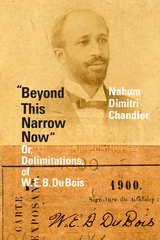3 books about Chandler, Nahum Dimitri

Annotations
On the Early Thought of W. E. B. Du Bois
Nahum Dimitri Chandler
Duke University Press, 2022
In Annotations Nahum Dimitri Chandler offers a philosophical interpretation of W. E. B. Du Bois’s 1897 American Negro Academy address, “The Conservation of Races.” Chandler approaches Du Bois as a generative and original philosophical thinker-writer on the status and historical implication of matters of human difference, both the fact of and the very idea thereof. Chandler proposes both a close reading of Du Bois’s engagement of the concept of so-called race and a deep meditation on Du Bois’s conceptualization of historicity in general. He elaborates on the way Du Bois’s thought in this address can give an account of the organization of the historicity that yields the emergence of something like the African American, at once with its own internal dimensions and yet also as an originary articulation of forces and possibilities that have world historical implications. Chandler refigures Du Bois’s thought as a vital theoretical resource for rethinking our concepts of differences among humans and, so too, our understanding of modern historicity itself.
[more]

"Beyond This Narrow Now"
Or, Delimitations, of W. E. B. Du Bois
Nadhum Dimitri Chandler
Duke University Press, 2022
In “Beyond This Narrow Now” Nahum Dimitri Chandler shows that the premises of W. E. B. Du Bois's thinking at the turn of the twentieth century stand as fundamental references for the whole itinerary of his thought. Opening with a distinct approach to the legacy of Du Bois, Chandler proceeds through a series of close readings of Du Bois's early essays, previously unpublished or seldom studied, with discrete annotations of The Souls of Black Folk: Essays and Sketches of 1903, elucidating and elaborating basic epistemological terms of his thought. With theoretical attention to how the African American stands as an example of possibility for Du Bois and renders problematic traditional ontological thought, Chandler also proposes that Du Bois's most well-known phrase—“the problem of the color line”—sustains more conceptual depth than has yet been understood, with pertinence for our accounts of modern systems of enslavement and imperial colonialism and the incipient moments of modern capitalization. Chandler's work exemplifies a more profound engagement with Du Bois, demonstrating that he must be re-read, appreciated, and studied anew as a philosophical writer and thinker contemporary to our time.
[more]

The Possible Form of an Interlocution
W. E. B. Du Bois and Max Weber in Correspondence
Nahum Dimitri Chandler
Duke University Press, 2025
In The Possible Form of an Interlocution, Nahum Dimitri Chandler provides an epistemological and theoretical elaboration of the correspondence between W. E. B. Du Bois and Max Weber in 1904 and 1905. Their interlocution took place under the heading of Du Bois’s famous formulation “the problem of the color line.” This study takes as its incipient reference Weber’s statement to Du Bois that “I am absolutely convinced that the ‘color-line’ problem will be the paramount problem of the time to come, here and everywhere in the world.” Chandler provides a concise statement of Du Bois’s thought of “the problem of the color line” as a general formulation for understanding African American matters within modern historicity on a worldwide scale. He then examines Weber’s earliest writings to understand in just what way “the ‘color-line’ problem", served as a problematization for Weber in both his thought and itinerary, across the 1890s and through the time of their interlocution.
[more]
READERS
Browse our collection.
PUBLISHERS
See BiblioVault's publisher services.
STUDENT SERVICES
Files for college accessibility offices.
UChicago Accessibility Resources
home | accessibility | search | about | contact us
BiblioVault ® 2001 - 2025
The University of Chicago Press









